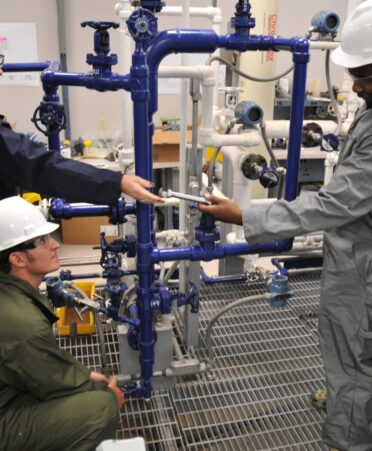(MARSHALL, Texas) – It takes a process, with trained people overseeing it, to make sure water stays clean and wastewater gets treated.
“There is an increase in demand for wastewater treatment process operators, but the number of jobs in this career field is less than jobs available in chemical plants and oil refineries,” said Nicholas Cram, lead instructor in Texas State Technical College’s Process Operations Technology program. “The benefits of a job in wastewater treatment is a day schedule, very few weekends, and you don’t work a 12-hour swing shift.”
According to the U.S. Department of Labor’s CareerOneStop website, water and wastewater treatment plant and system operators in Texas can make a yearly median salary of more than $39,000. It projects that there will be a need for more than 12,000 workers by 2028 in Texas.
“There will be an increased focus on wastewater treatment in our program due to the number of jobs available,” Cram said. “This is also a very rewarding career since water conservation and providing quality drinking water is critical to our survival.”
Having an area workforce that can work with water and wastewater treatment ties into economic development.
“You have to have capacity to have industry to come in,” said Steven K. Williams, city manager for the city of Carthage. “We are in good shape as far as that goes. With the labor force, you have a lot of technical people that work here in oil and gas. It is great if we can get an industry that uses them so they don’t have to travel. I think we have a good labor force.”
Randy Chelette, executive director of the Texas On-Site Wastewater Association in Bridge City, said as new growth takes place in cities and counties, more on-site septic, or underground wastewater treatment systems, are needed.
Chelette said there is a need now for designers, inspectors and maintenance workers to ensure that treatment systems maintain water quality and health standards.
“The systems of yesterday are old in the ground and passive but yet commonly failing septic systems because you relied on the soil to treat the wastewater,” he said. “Today’s technologies allow us to treat the wastewater prior to it going into the ground, so the ground does not have to meet the same qualities to treat the wastewater as in the old septic systems.”
Selina Tabor is manager of the city of Longview’s water purification division and oversees staff at the city’s three water plants that monitor water levels and pressure. The monitoring work is done through a computer, but every few hours samples are pulled for tests such as chlorine, temperature and pH levels. The work is guided by the Texas Commission on Environmental Quality.
“What we report to the state is what we physically run,” Tabor said. “What we are reading on the computer is keeping us in check.”
Tabor said she and her staff have thought about the future, when they will be retired and new workers will be needed to continue their work. She said internships are available to college students with interests in biology, chemistry and technology to give them experiences of what to expect after graduation.
“It’s a stable job,” Tabor said. “The stability is the key. When everything was closing down because of COVID-19, we never stopped working. Water is not going away, and neither is wastewater.”
TSTC offers an Associate of Applied Science degree in Process Operations Technology at its Marshall campus. Program graduates can also pursue jobs in the electrical, petrochemical, pharmaceutical and refining fields.
The program continues to add new equipment, including a fractional distillation hands-on trainer that students will start using in August.
“We focus on hands-on training, but projects in critical thinking using 3D virtual software are also valuable teaching tools,” Cram said.
Registration continues for the fall semester, with scholarships available. For more information, go to tstc.edu.
